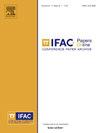基于几何力学的李群上机械系统的变量估算
Q3 Engineering
引用次数: 0
摘要
几何力学在变分力学的框架内分析机械系统,同时考虑配置空间的几何。从 20 世纪 70 年代末开始,这一领域的发展产生了若干连续时间和离散时间机械系统的几何控制方案。在 2000 年代中后期,几何力学首次被应用于机械系统的状态估计,特别是在作为构型流形的李群上演化的系统,如刚体系统。现有的基于几何力学的估算工作大多采用连续时间,使用确定性、半随机和随机方法。虽然有关离散时间李群估算方案的现有文献并不广泛,但有关该主题的文献与连续时间方案是同步的。本著作介绍了自 2010 年代中期以来,基于几何力学的连续和离散时间估计方案的一些最新和正在进行的研究,这些方案是利用应用于刚体系统的拉格朗日-达朗贝尔原理开发的。这种方法提供的(确定性)观测器设计具有很强的稳定性和鲁棒性。这项研究最后提出了将这种方法扩展到以主纤维束为配置流形的机械系统的可能性。本文章由计算机程序翻译,如有差异,请以英文原文为准。
Variational Estimation for Mechanical Systems on Lie Groups based on Geometric Mechanics
Geometric mechanics analyzes mechanical systems in the framework of variational mechanics, while accounting for the geometry of the configuration space. From the late 1970s, developments in this area produced several schemes for geometric control of mechanical systems in continuous time and discrete time. In the mid to late 2000s, geometric mechanics was first applied to state estimation of mechanical systems, particularly systems evolving on Lie groups as configuration manifolds, like rigid body systems. Much of the existing work on geometric mechanics-based estimation has been in continuous time, using deterministic, semi-stochastic and stochastic approaches. While the body of existing literature on discrete-time estimation schemes on Lie groups is not as extensive, the literature on this topic is contemporaneous with continuous-time schemes. This work describes some recent and ongoing research on geometric mechanics-based estimation schemes in continuous and discrete time from the mid-2010s, which were developed using the Lagrange-d’Alembert principle applied to rigid body systems. This approach gives (deterministic) observer designs with strong stability and robustness properties. This work concludes with potential extensions of this approach to mechanical systems with principal fiber bundles as configuration manifolds.
求助全文
通过发布文献求助,成功后即可免费获取论文全文。
去求助
来源期刊

IFAC-PapersOnLine
Engineering-Control and Systems Engineering
CiteScore
1.70
自引率
0.00%
发文量
1122
期刊介绍:
All papers from IFAC meetings are published, in partnership with Elsevier, the IFAC Publisher, in theIFAC-PapersOnLine proceedings series hosted at the ScienceDirect web service. This series includes papers previously published in the IFAC website.The main features of the IFAC-PapersOnLine series are: -Online archive including papers from IFAC Symposia, Congresses, Conferences, and most Workshops. -All papers accepted at the meeting are published in PDF format - searchable and citable. -All papers published on the web site can be cited using the IFAC PapersOnLine ISSN and the individual paper DOI (Digital Object Identifier). The site is Open Access in nature - no charge is made to individuals for reading or downloading. Copyright of all papers belongs to IFAC and must be referenced if derivative journal papers are produced from the conference papers. All papers published in IFAC-PapersOnLine have undergone a peer review selection process according to the IFAC rules.
 求助内容:
求助内容: 应助结果提醒方式:
应助结果提醒方式:


